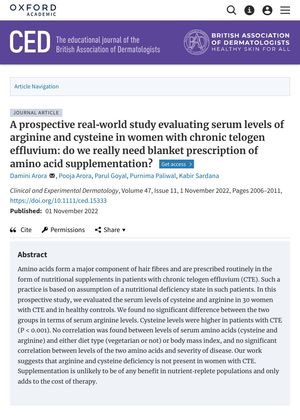 August 2022 in “Clinical and Experimental Dermatology”
August 2022 in “Clinical and Experimental Dermatology” Amino acid supplements may not be necessary for all women with chronic hair loss.
 January 2015 in “Journal of Nutrition and Health”
January 2015 in “Journal of Nutrition and Health” Fish oil improves hair growth in diabetic and high-cholesterol rats.
 November 2025 in “Dermatology and Therapy”
November 2025 in “Dermatology and Therapy” The drinkable supplement increased hair growth and was safe for women with hair loss.
 January 2017 in “Journal of Investigative Dermatology Symposium Proceedings”
January 2017 in “Journal of Investigative Dermatology Symposium Proceedings” The 2015 Hair Research Congress concluded that stem cells, maraviroc, and simvastatin could potentially treat Alopecia Areata, topical minoxidil, finasteride, and steroids could treat Frontal Fibrosing Alopecia, and PTGDR2 antagonists could also treat alopecia. They also found that low-level light therapy could help with hair loss, a robotic device could assist in hair extraction, and nutrition could aid hair growth. They suggested that Alopecia Areata is an inflammatory disorder, not a single disease, indicating a need for personalized treatments.
 3 citations
,
May 2018 in “Journal of nutritional health & food science”
3 citations
,
May 2018 in “Journal of nutritional health & food science” Nutritional supplements can help manage hair loss and promote hair growth by strengthening hair roots and countering harmful effects of pollution, smoking, and deficiencies in vitamins and minerals.







